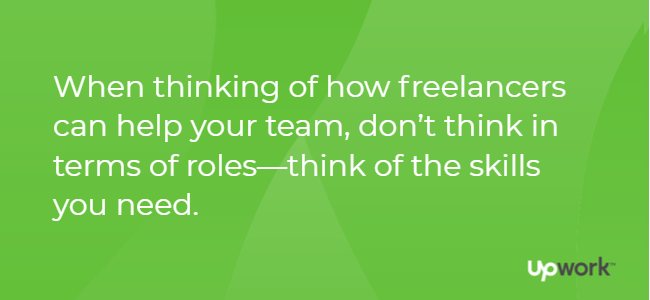
Although trends show over half of companies (53%) are using more freelancers than before, many people still have questions about how to work with them. Here are some of the most common questions and answers for each.
What is a freelancer?
A freelancer is a skilled independent professional or agency owner or member who only works on a project-by-project basis. They often specialize in areas such as IT, engineering, creative, and legal. Freelancers operating their own business can be an independent contractor (IC).
What can I get done with freelancers?
In general, if the work can be done off-site, it can probably be done by a freelancer.
In the past, these flexible workers were used for one-off projects like data entry or designing a logo. But more companies today are using freelancers for large or complex projects. Companies such as GoDaddy and GE use freelancers to create new product lines, launch marketing campaigns, analyze complex data, and more.
A growing trend is building freelance teams for longer projects. As these teams provide a cost-effective way for businesses to operate with greater speed and agility.
How do I identify what kind of freelancer I need?
When thinking of how talent can apply to your work, don’t think in terms of roles or tasks—think of the skills you need. That’ll help open you up to seeing what’s possible.
Instead of thinking I need to create a PowerPoint presentation by Friday, think: I need a graphic designer and I need a writer.
If your project requires multiple people, you can engage a freelance project manager or freelance agency to bring on the talent that’s needed for each stage of a project.
Remember that you don’t have to figure it all out yourself. Your HR and flexible talent program owner can help you identify the talent you need. If you’re an Upwork Enterprise client, be sure to contact your Upwork Professional for help from finding the ideal talent to planning a project.
How should I work with freelancers differently than employees?
Freelancers work on a project-by-project basis. When working with them, remember to respect their independence. These professionals maintain total freedom over how they do the work which may include contracting parts of the project out to other freelancers. And talent can work any hours, any day, from anywhere.
They may work independently, but they can also offer fresh perspectives and new ideas. As many freelancers bring years of experience working with multiple companies.
How do I handle compliance?
How you handle compliance is up to you. If your company uses a talent solution, you may have compliance services built in. Check with your HR or flexible talent program owner for specifics.
If you don’t use a talent solution, you can contract talent through a third party service. Services like this help you stay in compliance with IRS regulations and other applicable laws.
Can freelancers access my data or internal systems without risk?
Security is usually top of mind when working with internal or external talent. Be sure to follow your company’s internal security protocol.
Do I have clearance to hire freelancers?
You can usually contract talent for a project in a fraction of the time it takes to hire an employee. Most likely, your company has an approved channel for engaging flexible talent. Check with your HR or flexible talent program owner to gain access and learn tips for getting started.
If your company doesn’t have an established solution, you can contract talent directly through freelancing websites. These websites make it easy to connect with a global marketplace of talent from data analysts to videographers. The platform also streamlines much of the engagement process so you can get a project started quickly.
